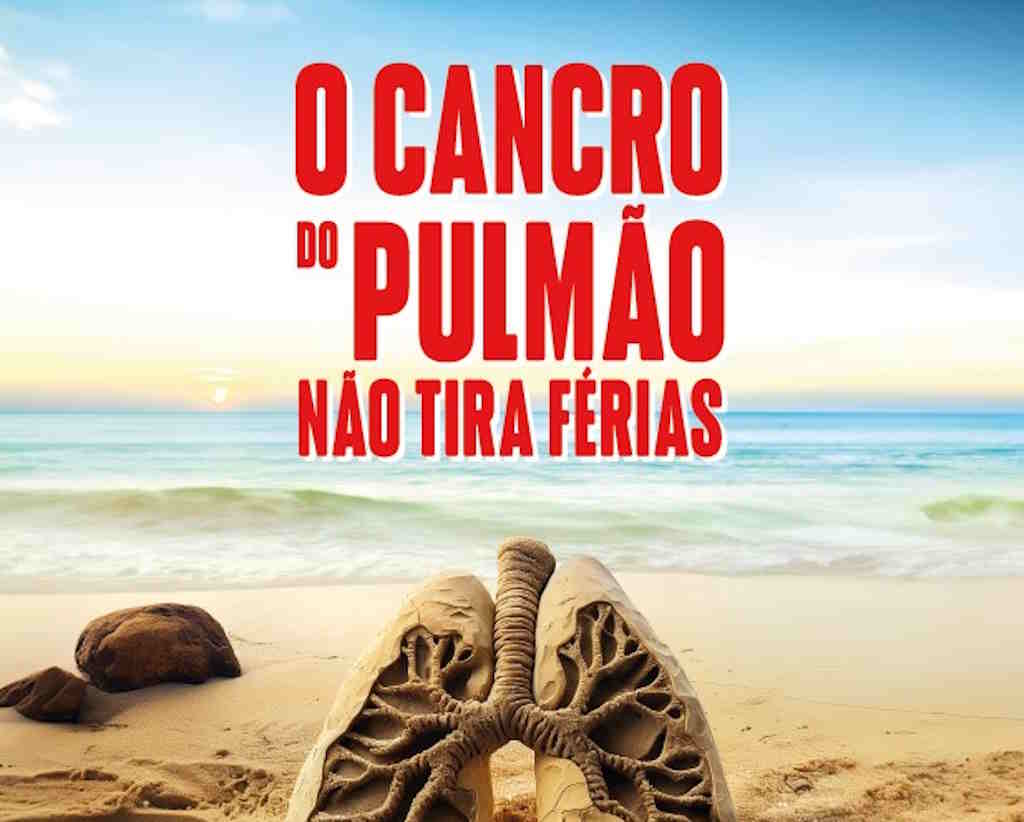Despite the investment and knowledge generated by scientific advances, lung cancer remains a serious public health problem, with its incidence continuing to rise worldwide. That is why the fourth edition of the book “Lung Cancer: Don’t Take a Holiday” has been published, which aims to raise awareness of the risk factors associated with this disease.
The importance of knowing risk factors [como o tabagismo ativo ou passivo; exposição a amianto ou radão; exposição a poluição, agentes químicos ou radioativos; história familiar de doença oncológica (1)] The ability to act early in detecting the disease is the slogan of this year's campaign.
According to Globocan data, in 2022 this disease affected more than two million people worldwide, and stole the lives of 1.8 million people (4). In Portugal, in the same year, there were about 6,000 new cases and 5,000 deaths linked to lung cancer, the fourth highest in incidence, but first in number of deaths (3).
“Symptoms are usually non-specific and late,” emphasizes Claudia Vicente, coordinator of the APMGF Respiratory Diseases Study Group (GRESP). “Literacy in the population is very important so that they can be aware of risk factors, family history and symptoms.”
Although in most cases there are no associated symptoms until the disease develops, there are signs to watch out for, such as a cough that does not go away or gets worse, coughing up blood, chest pain that generally worsens with deep breathing, hoarseness, loss of appetite, unexplained weight loss, shortness of breath or fatigue (2).
Maintaining a healthy lifestyle and paying close attention to risk factors are essential when talking about lung cancer, especially to face the current scenario: “It is the oncological disease with the highest associated mortality rate, largely due to the fact that the majority of diagnoses occur at an advanced stage of the disease, where despite the great advances in the treatment of this disease, the results are still modest,” says Isabel Magalhães, president of Pulmonale (Portuguese Association for the Fight against Lung Cancer).
Screening is an essential tool for early diagnosis of the disease, and is therefore of interest to medical and patient associations in this field.
“At the moment, there is still no screening programme in Portugal, although there is a lot of discussion and efforts by scientific societies to issue positions and even proposals to start lung cancer screening,” says Claudia Vicente.
“Lung cancer screening using low-dose CT has been shown to be effective, particularly in large studies (National Lung Screening Trial “The Nelson study), which reduced mortality by at least 20% by enabling early diagnosis,” adds Isabel Magalhães.
Given the importance of this topic, a pilot screening project has been presented to the public, as well as to health authorities, by Pulmonale.
“In addition to active and passive smoking, there are many other risk factors associated with the development of lung cancer. These may be environmental risk factors such as exposure to radon gas, chemicals or air pollution. On the other hand, with regard to the person, we can mention family history, previous respiratory diseases and lifestyle,” Claudia Vicente emphasizes.
“In Portugal, a combination of these factors may explain the increase in the number of lung cancer cases. The change in lifestyle, increasingly urban, with less exercise and changes in eating habits linked to air pollution in urban areas and exposure to chemicals in certain work environments, may contribute to the increase in lung cancer incidence. Furthermore, the increase in life expectancy and the ageing of the population may also lead to a greater number of cases, as the risk of lung cancer increases with age.
Regarding the challenges associated with the journey of lung cancer patients, Isabel Magalhães warns of “a lack of justice that must be changed”. Lung cancer is a complex disease, which must be treated in the following reference centres: Guidelines Up-to-date and with maximum response times for every stage of the patient journey. What is clear is that there are different realities, with consequences for patients.”
It is also worth highlighting the role of primary health care which, according to Claudia Vicente, “because of its proximity to the population, can intervene at different levels. On the one hand, they can work to stop smoking, which is a duty for all health professionals”, as well as “promoting a healthy lifestyle – exercise and a balanced diet”. On the subject of check-ups, the specialist says that “they must involve multidisciplinary collaboration between different disciplines, where general medicine and family medicine must participate in the identification and monitoring of patients”.
The “Lung Cancer Doesn’t Take a Holiday” campaign is an initiative of AstraZeneca, in partnership with the Careca Energy Association, the National Pharmacy Association (ANF), the Portuguese Society of General Medicine and Family Medicine (APMGF), the Respiratory Study Group of APMGF (GRESP), Pulmonale, the Sociedade Portuguesa de Pneumologia (SPP), and with the support of Rede Expressos.
References:
(1) Lung cancer and related risk factors: an update of the literature. A. Ruano-Ravina, A. Figueras, J.M. Barros-Diosa. Journal of the Royal Institute of Public Health. November 2002
(2) Signs and Symptoms of Lung Cancer. American Cancer Society. Available at https://www.cancer.org/cancer/types/lung-cancer/detection-diagnosis-staging/signs-symptoms.html Accessed 19 July 2024
(3) Global Cancer Observatory. Portugal Fact Sheet. Available at https://gco.iarc.who.int/media/globocan/factsheets/populations/620-portugal-fact-sheet.pdf
Accessed 19 July 2024
(4) Global Cancer Observatory. Available at https://gco.iarc.who.int/media/globocan/factsheets/cancers/15-trachea-bronchus-and-lung-fact-sheet.pdf Accessed 19 July 2024
Other articles of interest:

“Wannabe internet buff. Future teen idol. Hardcore zombie guru. Gamer. Avid creator. Entrepreneur. Bacon ninja.”

